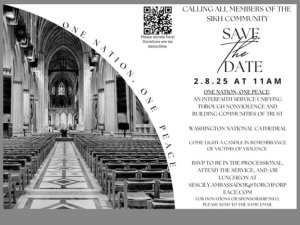In this highly digital age, I believe that face-to-face interactions allow us a chance to understand each other better. In person, we can communicate in a deeper way, opening up more possibilities for collaboration and knowledge sharing. With zoom and social media sites connecting us in an instant, in-person gatherings may seem a bit out-dated. Yet there is tremendous value in being together physically, connecting in a visceral way.
With these thoughts in mind, this August I will be a grateful participant at the Parliament of the World’s Religions, which is being hosted at the McCormick Place Lakeside Center in Chicago, Illinois, USA. The Parliament will take place from August 14th through August 18th, and this year’s theme is: A Call to Conscience: Defending Freedom and Human Rights.
During the Parliament, I have been invited to take part in a panel with two other learned women - Dr. Alka Arora and Ms. Piyali Mitra. The focus of our panel? Understanding and Transforming Systemic Religious Patriarchy.
As a woman who fell in love with the philosophy of Guru Naanak, one of the key teachings that resonated with me was the way he challenged the idea that women were inferior to men. Although today we talk about feminist thought and feminist movements, Guru Naanak was one of the first advocates of women’s rights from a spiritual perspective. Over 500 years ago, he denounced the notion that God made women less than men. The same Divine Light dwells in the hearts of all people equally. To consider women inferior was spiritually mistaken.
In the sacred poetry of Guru Naanak and his successors, they sometimes write in the voice of the Bride, longing to meet with and join her Husband. This willingness to make the feminine voice sacred, to elevate that as the “voice of the soul,” is a powerful vehicle to transform the place of women in spiritual life.
During the panel, I will share perspectives about encountering the Divine Feminine within Gurbani.
Dr. Alka Arora is an associate professor in the Women's Spirituality program at the California Institute of Integral Studies. She joined the faculty in 2011 and helped develop the MA program in Women, Gender, Spirituality, and Social Justice. For over a decade, Dr. Arora has been developing the field of integral feminist education and feminist spiritual activism, working alongside sister scholars to offer a transdisciplinary and socially engaged approach to the study of gender, spirituality, and religion.
As part of this panel, Dr. Arora will share approaches for transforming internalized patriarchy and deepening participants’ connection with the Sacred Feminine within. She will discuss how religions around the world have curtailed women’s rights and disparaged the feminine. Patriarchal religious conditioning has instilled in many women a deep sense of inferiority, sinfulness, or shame. Nonetheless, women have persisted throughout history in seeking deep connections with the Divine. Dr. Arora is of Hindu descent. She draws upon myths and sacred stories from multiple traditions to explore ways that women can strengthen their sense of personal sanctity, sovereignty, and agency.
Ms. Piyali Mitra is pursuing her PhD from the University of Calcutta, Department of Philosophy, India. She is also working on a project of embryo research from a moral, empirical, feminist, and religious perspective. Broadly speaking her research involves the study of personal identity, Habermasian Philosophy, Buddhism, Islamic and Judeo-Christian praxis, along with ancient Hindu practices. She has been a visiting scholar and participant in the Council for Research in Values and Philosophy, at the Catholic University of America McLean Centre for the Study of Culture and Values, Washington DC., USA.
Ms. Mitra focuses on the social location of women in religion. During the panel, she will share her scholarship, which is based on the post-structuralist approaches of Foucault and Gramsci to understand women's choices under patriarchal religions. Her perspective attempts to understand the portrayal of women in religious texts and the status of women in context to the different interpretations of sacred literature of the very popular religions; namely, Christianity, Hindu, and Islam.
Dr. Alka Arora, Ms. Piyali Mitra and I (SS Ek Ong Kaar Khalsa Michaud) will be discussing these and other ideas during our panel, Understanding and Transforming Systemic Religious Patriarchy, at the Parliament of the World’s Religions.
With these three different but complementary approaches to the topic, the panel promises to offer deep food for thought to all who attend.
We invite you to be with us during this panel which will take place on Monday, August 14th from 1:00 pm to 2:30 pm. The panel conversation will be in Hall E, Room 255 of McCormick Place Lakeside Center during the 2023 Parliament of the World’s Religions. (Please note an earlier version of this article listed a different room number, but that has now been updated with the correct information.)







